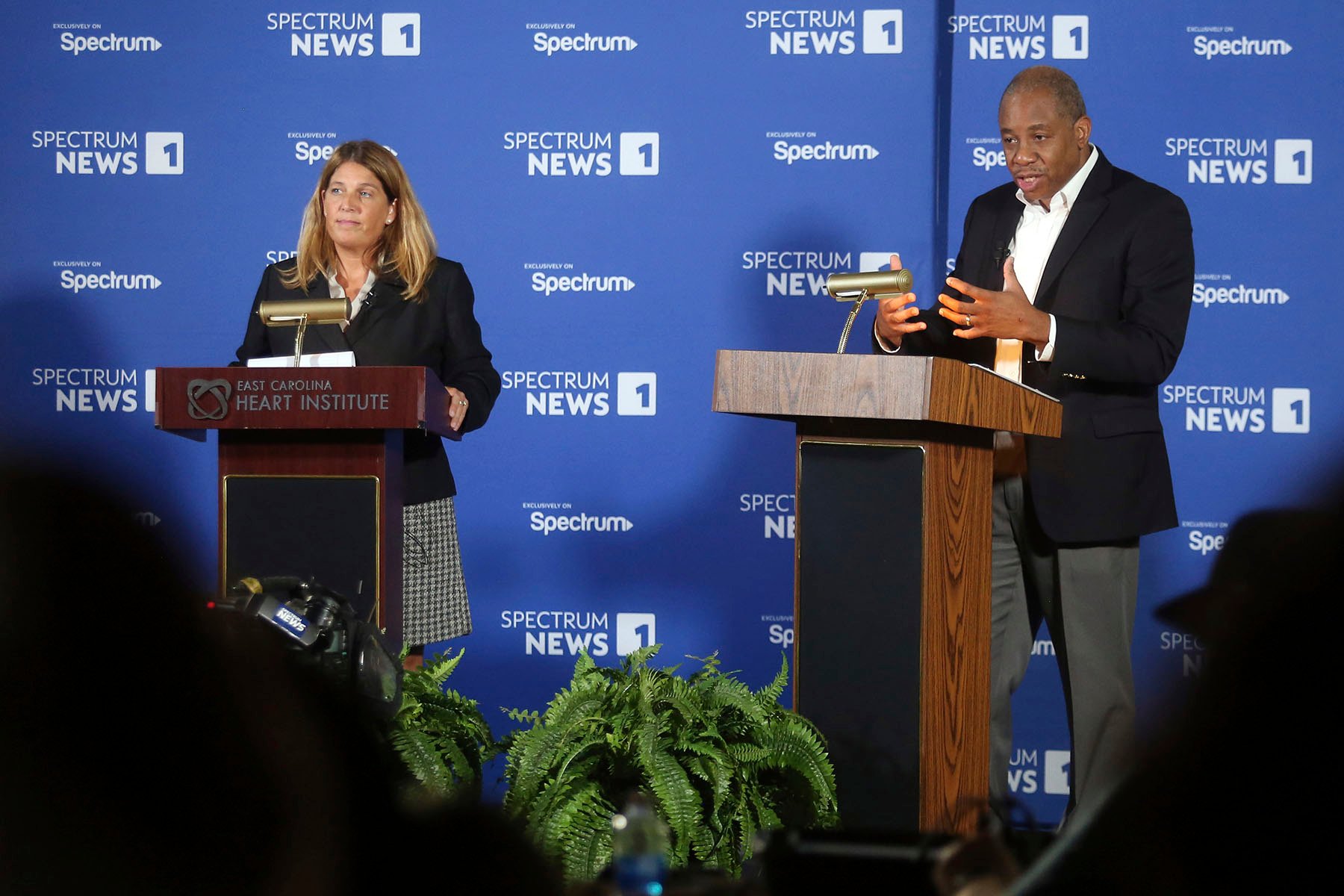Editor’s note: This article has been updated throughout.
Update: Decision Desk HQ projects that Mo Green defeated Michele Morrow by a margin of 51.1 percent to 48.9 percent to become North Carolina’s next state superintendent of public instruction.
Stumping for Vice President Kamala Harris in North Carolina, former President Barack Obama took a break from discussing the presidential election to focus on a local race in which he’s admittedly “self-interested” — state superintendent of public instruction.
Why does the former president feel personally invested in who leads schools in the Tar Heel State? For starters, Republican Michele Morrow, who is running against Democrat Maurice “Mo” Green, called for Obama’s public execution four years ago. During the same period, she took to social media to support executing other public figures, including Dr. Anthony Fauci, Hillary Clinton, Sen. Chuck Schumer and North Carolina Gov. Roy Cooper.
“The Republican candidate has been spreading conspiracy theories and thinks I should face a firing squad,” Obama said at an October 25 rally in Charlotte, referring to Morrow’s repeating of QAnon propaganda. “We can’t have somebody saying just crazy stuff, running your school system, purchasing textbooks, allocating resources for our kids,” he continued.
A representative for Morrow did not respond to The 19th’s repeated requests for comment, but the candidate has previously described her remarks about Obama as a “joke.” Her seeming embrace of political violence — she attended a January 6, 2021, rally close to the U.S. Capitol — has concerned some moms in her neighborhood in Cary, North Carolina. The same goes for her vilification of teachers and LGBTQ+ people in ways that imply these individuals are threats to children. The concerns about Morrow, however, extend beyond her divisive rhetoric. The mother of five has been a registered nurse and homeschool teacher but never held public office or worked as a licensed educator. In contrast, Green is the former superintendent of Guilford County Schools and former general counsel and deputy superintendent for Charlotte-Mecklenburg Schools, two of the state’s largest districts.
Still, the race is neck-and-neck, with the Obama-endorsed Green leading Morrow by just 2.5 percentage points, according to a survey of 600 likely North Carolina voters conducted by the polling firm Cygnal from October 12 to 14 with a margin of error of ±3.99 percent. Another poll shows Morrow with a 1 percentage point lead over Green.
Campaigning with the motto “Make Education Great Again,” a twist on former President Donald Trump’s “Make America Great Again,” Morrow has routinely criticized the state’s public schools and expressed support for vouchers that would divert funding away from them, a policy stance backed by Trump and Project 2025, a blueprint for the next Republican presidential administration. Green, though, has pitched himself to voters as a leader who supports public education and has the experience to oversee the North Carolina Department of Public Instruction, which includes more than 2,500 public schools and a roughly $11 billion budget. The state superintendent also serves as secretary and lead officer of the State Board of Education, which Morrow wants to abolish just as Trump plans to dismantle the Department of Education.
As Harris and Trump face off in a presidential race that’s become a dead heat, the Green-Morrow matchup is just as close and contentious. It is a microcosm of how the culture wars are playing out in classrooms nationally, with Democrats expressing support for educators, public schools and equity and inclusion as conservatives push to privatize education while sowing distrust in public schools by characterizing them as radical left “indoctrination centers.”
Given Morrow and Green’s starkly different views on public education, the winner of the state superintendent race could shape schooling in North Carolina for years to come, Green contends.
“I do believe that the very soul of public education is on the ballot this November, and I also believe that it’s going to take champions of public education to meet this moment,” Green said. “That certainly includes things like the funding of our public schools, but it goes beyond that to where I see the direction of our public schools going, particularly if my opponent is elected.”
Morrow has described the public school system as “an absolute cesspool of evil, lies and deception,” he pointed out. Moreover, the private school vouchers she backs would not only siphon funding from public education but make it more difficult for public schools to provide students with a wide range of resources, he said. Like scandalized Republican gubernatorial candidate Lieutenant Governor Mark Robinson, Morrow also supports the state rejecting federal education funding; North Carolina received nearly $1.7 billion in federal monies for the 2023-24 school year.
“So I do believe that we have reached a moment where this is no longer simply about two candidates running for office who believe in public education but maybe have different ways of approaching it,” Green said. “North Carolina is faced with a candidate who, if elected, would actually be trying to dismantle our public education system. This is a critical moment for North Carolina and for public schools in North Carolina.”
Although Morrow’s controversial statements have garnered national headlines, many voters simply don’t know about her past remarks or policy stances, which is why Green and his supporters believe the state superintendent race remains so close.
“It’s really important for voters to understand the enormous policy consequences of electing extremists,” said Shaun Harper, a professor of education, public policy and business at the University of Southern California. “Those candidates’ radical viewpoints could negatively affect the lives of thousands of students. . . . This is one of many ways in which partisan politics lead to harmful policymaking.”
At a minimum, Green said, the state superintendent of public instruction should be an advocate for public education. On her website, Morrow said that she attended public school and that her “five children attended public, private, and homeschool over the past 20 years,” explaining that she homeschooled them “when the system didn’t meet [their] needs.”
Susan Book, a disability education advocate and parent of a ninth grader with autism, has similar concerns about Morrow. Book first encountered Morrow three years ago at Wake County school board meetings, where she said Morrow opposed masks in schools to stop the spread of COVID-19. When President-elect Biden said in 2020 that he would have all Americans in masks, Morrow responded on social media: “Never. We need to follow the Constitution’s advice and KILL all TRAITORS!!! #JusticeforAmerica.” In 2022, Morrow unsuccessfully ran for a seat on the Wake County Board of Education. Despite that setback, she beat incumbent state Superintendent Catherine Truitt during the Republican primary election in March with support from organizations like Moms for Liberty, a parental rights group that has been characterized as extremist by the Southern Poverty Law Center.
“None of the problems that Michele Morrow is talking about are actual real problems in our schools right now,” Book said. “So that alone poses a danger. Her absolute ignorance of how our schools work poses a real danger.”
That includes Morrow’s suggestion that students in special education classes be separated from other youth because they “cannot compete” with them. Federal law requires students with disabilities to be included in the general learning environment as much as possible. Moreover, Morrow has used a term that is widely considered offensive and outdated to describe students with intellectual disabilities.
“It’s so frightening that in terms of children with disabilities, she has talked openly about how maybe they don’t need to be in the classroom with their peers,” Book said. “She did use the R-word at a PTA debate. You should never even use that word. I can’t even say that word out loud, and it rolled off her tongue as if it was nothing. That tells me something about her character. She does not respect every child, and she’s going to represent our entire state?”
Ashley Reynolds, the mom of a queer ninth-grader in Cary, said that Morrow does not represent her child’s needs. The candidate suggested in a September post on X that the “+” in LGBTQ+ stands for pedophilia, outraging both members and supporters of that community. Morrow also said that Green would not keep children in the state safe because he was “proudly endorsed” by LGBTQ+ advocacy group Equality North Carolina. She criticized him for opposing the state’s Parental Bill of Rights, legislation signed in 2023 requiring parents to be informed before their children alter their names or pronouns. LGBTQ+ advocates say the law could lead transgender and nonbinary youth to be outed to families who may not be gender affirming. Morrow has also expressed concern that some educators are “groomers.”
“Her idea that the schools can brainwash your child into being queer or transgender is extremely out of touch with what’s going on,” Reynolds said. “The idea that you can change somebody in that way just shows her complete lack of knowledge and education on that topic.”
Reynolds said her son worries that Morrow will eliminate programs that help queer kids or otherwise infringe on their rights if elected. He is bracing himself for what Morrow plans to do, all while taking in anti-LGBTQ+ attack ads associated with the Trump campaign, Reynolds said.
LGBTQ+ youth at schools with a high number of anti-LGBTQ+ policies reported higher rates of suicidal ideation in the past year (55 percent), compared to their LGBTQ+ peers at schools with fewer (43 percent) or no anti-LGBTQ+ policies (35 percent), according to a study of 18,000 youth released in August by the The Trevor Project, a nonprofit that works to prevent suicide among LGBTQ+ youth.
“We saw 13 anti-LGBTQ+ bills filed last session. Three of them became law. This is all very devastating to our young people,” said Eliazar Posada, executive director of Equality North Carolina. “We’re sending out a message saying that who they are is wrong, who they are is not what is welcomed in our state, in our communities, and we know that, based on information from the Trevor Project, how much even introducing a bill hurts the mental health of our young people.”
Having a candidate for state superintendent of public instruction engage in anti-LGBTQ rhetoric only makes it harder for young queer people trying to cope in an often hostile world, Posada added.
Renee Sekel, a deputy director with the North Carolina chapter of Red, Wine & Blue, an organization that provides suburban women with the tools to politically organize in their communities, said that she has a host of concerns about Morrow. They range from Morrow’s support of rejecting federal funding for North Carolina schools to her statements about marginalized youth. In a nutshell, Sekel said, Morrow’s education policy amounts to “subtraction.”
-
Read Next:
“It’s about reserving education for the kids that she believes are worth it,” said Sekel, who lives in the same area of Cary as Morrow, Reynolds and Book. “That’s not gay kids, Black kids, English language learners or disabled kids.”
Even if a far less controversial candidate were his opponent, Sekel said that she would still support Green because he has experience running a large school system. He also served as executive director of the Z. Smith Reynolds Foundation, a nonprofit that works to improve North Carolinians’ quality of life, with a particular focus on affordable housing, education and the environment. Morrow lacks comparable experience, having never served in an executive role at a company, organization or school system.
Electing novices to roles in which they will make decisions about millions of dollars in education spending is “reckless,” said Harper of the University of Southern California. “It’s even more dangerous when those candidates’ racist, sexist, homophobic and transphobic perspectives result in policies that undo decades of progress for local communities and our nation more broadly,” he said.
Green said that he decided to run for state superintendent because he wants to use his career in education to effect change. He’s concerned that public schools have been woefully underfunded and educators don’t receive the respect and pay they deserve. Student achievement is also a policy priority for him.
“I’m going to do everything I can to be sure that every child in North Carolina receives an excellent public education,” he said.









